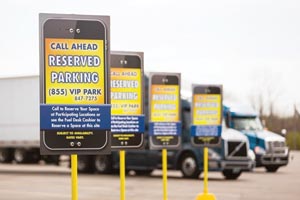Senior Reporter
Truckers Balk at Having to Pay To Reserve Parking, ATRI Says

Nearly half of commercial vehicle drivers in a survey by American Transportation Research Institute said they would refuse to pay for reserved parking.
The ATRI survey of 1,417 drivers, most of them truckload, said that reservation parking systems near large metropolitan areas would have the highest utility for them.
However, the survey showed that there is a “disconnect” between drivers’ interest in parking reservation systems and their willingness to pay for parking reservations.
“When asked who should pay for any associated reservation fees, 46.8% of truck driver respondents state that the motor carrier should be responsible,” the survey said. “Another 20.7% believe that it is most appropriate to split the cost between the carrier and driver, and only 15.3% of drivers feel it was solely the responsibility of the truck driver.”
Regardless of who pays, 52% of for hire-drivers indicated a preference for reserving parking near major metropolitan areas compared with 39% of private fleet drivers.
Employee drivers preferred that the motor carrier pay, according to ATRI.
The survey, made public Sept. 21, was taken at this year’s Mid-America Trucking Show on March 26-28 in Louisville, Kentucky. Additionally, it was available online through ATRI’s website from March 31 to May 1.
“The survey results demonstrate that the reservation system concept, independent of pricing and payment responsibility, appears to have utility, particularly in areas where parking capacity is in highest demand, ATRI said.
The survey was taken, ATRI said, because legal truck parking historically has been a major issue for motor carriers and commercial drivers, but that the problem is reaching a critical juncture.
“State budget woes have led to the elimination of many hundreds of public truck parking spaces, the survey said. “Evolving supply chains and truck operational changes have moved the truck parking ‘sweet spot’ for many urban areas.”
“Understanding the expectations of trucking companies and professional drivers is of critical importance to truck-stop operators,” Lisa Mullings, CEO of Natso, the association representing truck stops, said in a statement. “ATRI’s analysis will provide important guidance to truck stops as they work to meet their customers’ operational and safety needs.”
Recently, the federal government reported that it found a dire shortage in metropolitan areas, too. The U.S. Department of Transportation on Aug. 21 published results of a congressionally mandated report from the Federal Highway Administration, showing more than 75% of truck drivers and almost 66% of logistics personnel reported regularly experiencing problems with finding safe parking locations.
The concerns prompted national and regional advocates to form the National Coalition on Truck Parking to plan ways to improve parking availability.
The issue is also critical because federal law requires a driver come from behind the wheel for 10 hours to comply with hours-of-service deadlines.
ATRI’s Managing Critical Truck Parking initiative was driven by the selection of truck parking as one of the top priority research topics for 2015 by ATRI’s Research Advisory Committee.
ATRI’s most recent industry surveys, Critical Issues in the Trucking Industry, show “truck parking” moving to a rank of sixth from eighth as the most important industry issue between 2012 and 2013. By 2014, it was the No. 2 issue among truck driver respondents, ATRI said.
“Carrier-paid reservation fees would aid the acceptance of a reservation-for-fee system by the crucial stakeholders — commercial vehicle drivers — and certain driver populations are inherently more accepting of reservation-for-fee systems than others,” ATRI said.
A possible unintended outcome to an expanded implementation of a reservation-for-fee system may be increased illegal parking — particularly on interstate shoulders and ramps, ATRI said.
“Parking in these locations leads to higher safety risks including being hit by other vehicles,” the study concluded.

